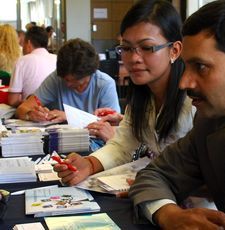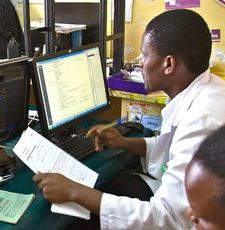ABOUT THE RESOURCE
In 2011-2013 EIFL provided financial support to 34 projects that implemented national and institutional open access (OA) advocacy campaigns to reach out to research communities and OA publishing initiatives.
Through small grants and support from their own institutions, the projects engaged in a wide variety of campaigns and activities, including: holding workshops, creating websites, building institutional OA repositories, creating e-learning courses, and implementing OA publishing platforms.
The case studies resulting from the projects reveal impressive first-time achievements and will help increase the availability of research literature in developing and transition countries.
Learn more about the key achievements for this institutional OA campaign in Sudan below. You can access the full case study (strategies, tactics and tools, success stories and lessons learnt) by clicking on the download button.
ABOUT THE PROJECT IN SUDAN
In 2011 EIFL funded a project: “Open access awareness-raising campaign among researchers at the Faculty of Science, University of Khartoum (UofK)” (acronym: OASCIR) implemented by the Faculty of Science, UofK with the partner: GrandIR, CB, and travel support provided by Carlos III University Madrid.
The project was aimed to raise awareness about OA at the Faculty of Science, UofK, through a series of training activities for scholars and the implementation of an OA repository for researchers to deposit their research output.
The UofK is the leading higher education and research institution in Sudan, over half the Sudanese research output is produced at UofK. The Faculty of Science was selected as a focus for the OASCIR Project because researchers affiliated with this Faculty produce high quality research that is little known to the outside world. Academic staff affiliated with the Faculty of Science publish a large number of articles and conference papers and also theses and dissertations which are only available in print format, on shelves in their Departmental and/or Postgraduate Faculty Library. The only document that was published OA at that time and was available online for those who knew it existed was the Sudan Journal of Science. In our opinion, it was important that another form of exposure and means of sharing with the research community worldwide be identified. Setting up a repository seemed the best way of achieving this objective, while at the same time serving as a tool for raising the visibility of the institution as well.
KEY ACHIEVEMENTS
- Dspace@ScienceUofK repository (the first in Sudan) is live and its contents are steadily growing; currently over 221 documents are openly available.
- Since launch, there has been an increase in usage, reaching a high of over 1121 downloads in one month.
- Three training courses were held: 1) copyright issues and content deposition into the repository mainly designed for librarians and IT personnel (in July); 2) OA and repository for researchers (in July); and 3) Managing the repository for repository administrators and managers (in November). Over 50 people attended the training sessions.
- Awareness raising activities have been carried out for Faculty of Science scholars and students, inspiring several to publish OA for the first time; and providing librarians with the knowledge to advocate for OA.
- A proposal for the UofK to take steps towards adoption of an institutional OA policy was well received and the UofK is currently considering signing the Berlin Declaration.
- The UofK Vice Chancellor endorsed the project to be university-wide (thereby encouraging other faculties to join).
- The project has attracted national attention with the Sudanese Council of Ministries Documentation Department naming it a project of significant, national importance.
- The OASCIR managers have received many invitations to present at various events, both national (such KMCA2012 Workshop that took place in January 2012) and international (OA Africa 2011 Conference in Ghana).
- The entire project has been documented on the OASCIR blog, thereby facilitating replication by other institutions.
- The project has had a very high impact on the UofK ranking at the January 2012 Webometrics edition of the Ranking of World Universities (#11 in the Arab world rank: compared to #29 in January 2011; and #13 in the African continent rank).
SHARE / PRINT









